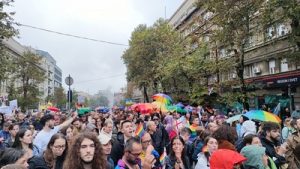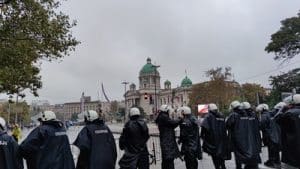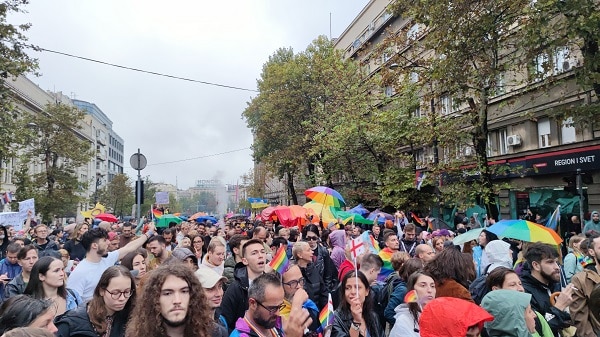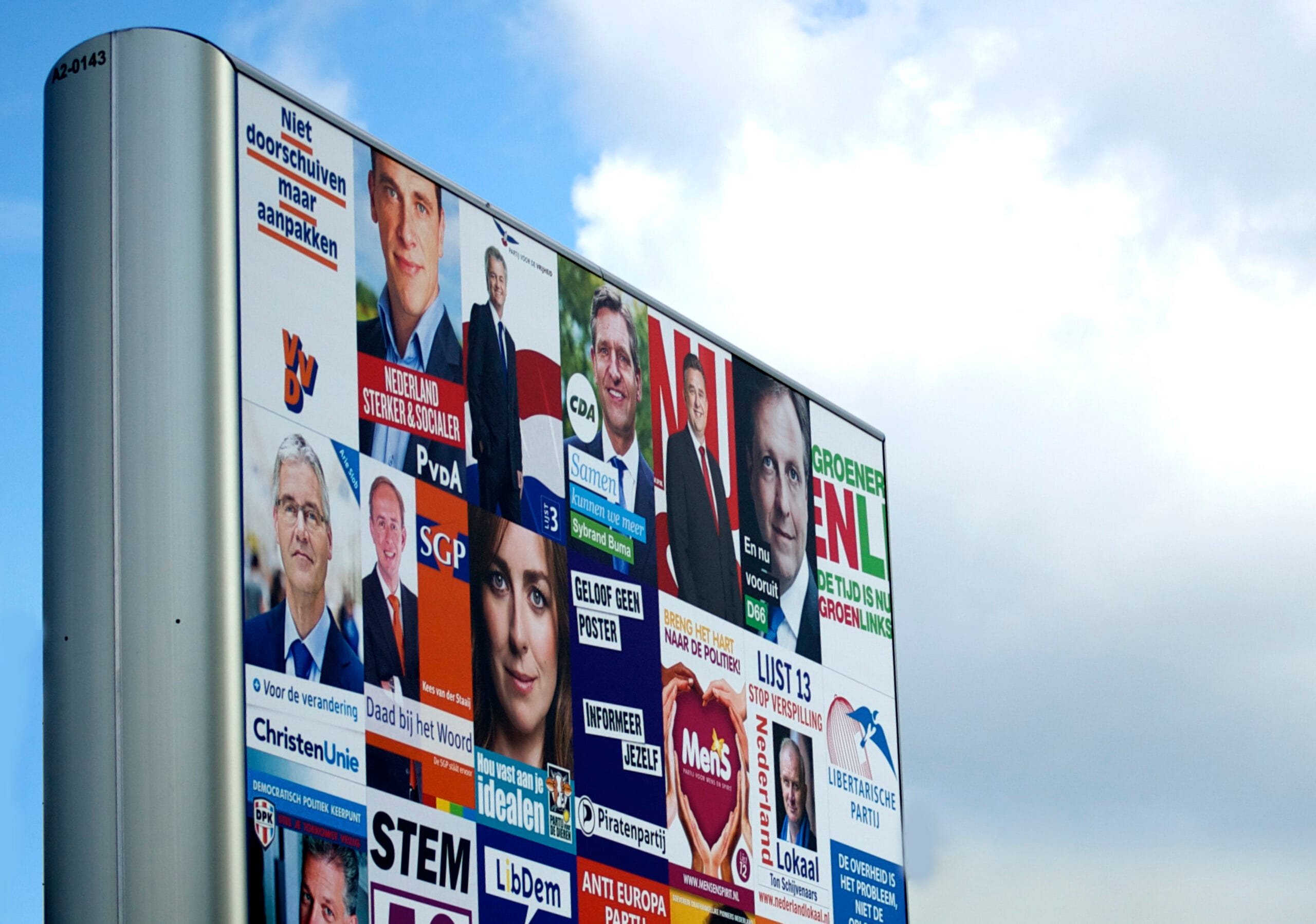In spite of an initial ban by the Serbian government, Saturday 17 September saw thousands walk through Belgrade in the first EuroPride march ever in the Western Balkans. Despite attempts at stirring trouble, the historic parade took place without major incidents.

Despite the rain, thousands marched in Belgrade on Saturday. Picture by Miloš Đajić.
The announcements by the Serbian government of a ban, as well as pouring rain which participants called “the worst weather conditions since the start of Pride walks in Serbia”, could not stop two to three thousand people from marching through Belgrade on Saturday 17 September.
The run-up to EuroPride had been marked by threats from nationalists and anti-LGBTI groups and a ban by the Serbian Interior Minister, who forbid the march on Tuesday over alleged “security concerns”. On Friday, Serbia’s Ministry of Internal Affairs upheld the ban, saying he would not succumb to “the pressures of the great powers of the West.”
The local organisers, however, were adamant. Despite the ban on the EuroPride march, they announced that the event would be held on Saturday. If the ban was not lifted, the organisation said it would walk nevertheless.
Various European countries, the Council of Europe – the continent’s top human rights body – and Members of the European Parliament (MEPs) also repeatedly called on Serbian authorities to let the march go ahead. Among them was also Marc Angel, MEP for the Social Democrats. “A pride without a march is not a real pride.”
Thousands march for LGBTI equality
In the end, the pressure had its desired effect. At the last minute, on the morning of the march, Serbian Prime Minister Ana Brnabić said that the 2022 EuroPride March could take place.
“My admiration goes out to the organisers of EuroPride for their perseverance and dedication,” said Miloš Đajić, president of the Centre of Modern Skills in Belgrade – the partner of the FMS in Serbia.
Diplomats, Members of the European Parliament, and European and international leaders joined hundreds of activists as they walked through Belgrade. “The presence of politicians and European civil society, as well as guests from Canada and the United States, and the European Commissioner, created a larger responsibility for the Serbian government to ensure protection,” Angel says.

5,000 police officers were deployed across Belgrade. Picture by Miloš Đajić.
There were also counter demonstrators present at the event. Though they were not as many as the Serbian government had predicted, still more than 5,000 police officers were deployed across Belgrade to protect the march.
Angel: “I could see the counter demonstrators on different corners. Serbia has annual Pride parades that do not usually attract this level of attention. I think the fact that this was EuroPride, emboldened nationalist and anti-European forces. They were not only shouting about LGBTI rights, but also about the EU, Kosovo and Russia.”
But in response to the nationalists, Angel says: “We were not there for Europe, we were there for Serbia. For Serbians who believe in democracy.”
Democracy under pressure
That democracy is under pressure in Serbia, is something that many are worried about. The initial decision by the Serbian government to ban the EuroPride event, was not only a step back in the progress that the country has been making to advance LGBTI rights, but also a step back in the Serbian path to European Union membership.
Milos: “We saw that an attempt was made to play with basic democratic principles and rights in a country that has the status of a candidate for EU membership.”
Member of the European Parliament for the Dutch Labour Party (PvdA) Thijs Reuten was an observer of the Serbian elections in April, and saw firsthand how democracy is under pressure in Serbia. “The Serbian state has a legal duty to guarantee the safety of EuroPride,” he said. “Instead of playing cynical political games on the backs of the LGBTI community, Vučić would do better to focus on strengthening the Serbian rule of law. Because this way, EU accession will remain very far away for Serbia.”
Angel said he was “very annoyed” by what he calls the Serbian government’s “double strategy”. While the Prime Minister announced that the march could happen safely, the interior minister had said something different.
Miloš Đajić said that this is not new. “The constant exhausting of people with unnecessary entanglements, legal snags, breaking deadlines and rules, burying information… This is a tactic that has been seen many times. Unfortunately, it often results in people getting tired and giving up, which is the goal.”
“What we can and must do is strengthen civil society in Serbia,” says Marc Angel, “so that they can help the country make democratic progress on the road to EU accession.”
“It is necessary for all social actors from political parties, civil society, trade unions to gather around the basic values we agree on,” says Miloš. “This is the only way we can encourage a larger number of passive and fearful people to join the pro-European forces in Serbia.”
“Saturday showed that there are people who are not afraid”
While Serbia has made gains for the LGBTI community, anti-LGBTI sentiment is still very prevalent. The Equal Rights Association confirmed that several LGBTI+ activists were severely injured in an attack in Belgrade on the evening of the march, as a group of eight or more hooligans hit and beat them. According to ERA, nearby police did not intervene.
This is why it was very important for the LGBTI community in the Western Balkans that this march happened, says Marc Angel. “It was not only important for Serbia, but for the whole region and countries like Montenegro and North Macedonia, where progress is slowly being made.”
“The parade was held and that is the most important thing,” says Miloš. “After a campaign to spread fear and raise emotions about the human rights of the LGBTI community, saturday showed that there are people who are not afraid.”




